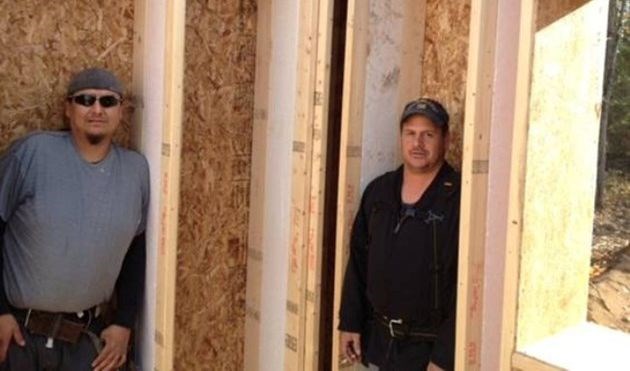Nadine Roach hopes to move in to her new super, energy-efficient home in Garden River First Nation by Christmas.
“She’s an extreme green lady, and we’ve worked with her for the last six months putting together a design,” said SuperSHELL Homes owner Ross MacLean, speaking to SooToday.
SuperSHELL, which MacLean runs with business partner Glen Chiblow of Garden River, specializes in building energy-efficient homes.
In 2006, Canada Mortgage and Housing Corporation held a competition in which 20 builders across Canada were chosen to come up with highly energy-efficient ‘home of the future’ house designs.
North Bay-based SuperSHELL Homes was one of them.
One of the unique features of the Garden River home is the amount of insulation being used.
SuperSHELL is not using spray foam insulation, but rather, mineral wool insulation instead.
“We’re using three layers of mineral wool insulation,” MacLean said. “It resists moisture.
“You don’t get the cold spots in the drywall.”
Three layers of mineral wool insulation brings the house up to an R66 insulation value, which, MacLean said, is considerably higher than a typical Energy Star home’s R28 insulation value.
“Basically, it has a wall system that is two to three times as thick as any Energy Star home or R2000 home, so it’s considered an extreme green home.”
“It’s definitely not cheaper. A typical house would have $4,000 to $6,000 worth of insulation in it, but this one has nearly $20,000 worth of insulation in it,” MacLean said.
The benefit of paying for all that extra insulation?
Long-term savings on heating costs.
“With a SuperSHELL structure, which needs minimal heat, now you can put electric baseboard (heaters) in and it’ll rarely turn on,” MacLean said.
“You may be spending more on the structure but in the long run you’re saving…it’s a guaranteed payback with no maintenance, better than buying a new furnace every few years.”
It’s estimated Roach will save at least 50 per cent on her heating bills.
Then there are the wall studs.
“The studs (which are 16.5 inches) have an R30 value…a typical wall stud in a home has a value of about R6,” MacLean said.
The company started building the Garden River house in late October.
The owner hopes to move in to her new home by Christmas, and SuperSHELL hopes to hold an open house in January.
“We’ll have a weekend where people can come and take a walk through,” MacLean said.
So how’s business?
“It’s a niche market because most people don’t pay attention to what’s behind their walls, but we build in a different way — whatever the customer needs.”
MacLean said his company is employing mostly local labourers to build the home.
SuperSHELL is also building a group of homes in Marten Falls, a remote First Nation community about 300 kilometres northeast of Thunder Bay.
SuperSHELL was established in 2006 and made its mark by building an energy efficient eight-plex unit on Saugeen First Nation, built totally by First Nations people.
“That was a really wonderful project,” MacLean said.




